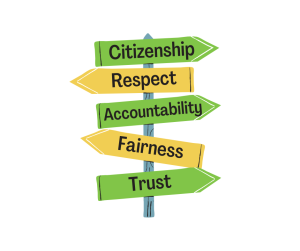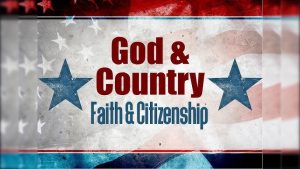 This is part two of our four-part collaboration with my friend and fellow writer, Nick Halaris of Profit+, on morality. Back in April we published our first article, “Toothpaste and the Moral Compass”, about the profound importance of building a moral compass in life. This piece is an essay about the relationship between morality and a properly functioning democracy. Given the signs of moral degradation, we see everywhere in our body politic, this couldn’t come at a better time. Hope you enjoy!
This is part two of our four-part collaboration with my friend and fellow writer, Nick Halaris of Profit+, on morality. Back in April we published our first article, “Toothpaste and the Moral Compass”, about the profound importance of building a moral compass in life. This piece is an essay about the relationship between morality and a properly functioning democracy. Given the signs of moral degradation, we see everywhere in our body politic, this couldn’t come at a better time. Hope you enjoy!
Nick Halaris and Coach Mahr:
As we’ve fallen further and further under the hypnotic spells of modern technology, we’ve forgotten something fundamental. Politics isn’t just some game we play; it’s one of the most serious things we are asked to do in this life. And like it or not, to engage in politics in the right way we need a collective moral compass.
Strong citizenship requires strong morality. Period. What is society without a moral foundation? Nothing more than a loose collection of individuals, or, perhaps a gang. Morality, by providing the sense of right and wrong to guide individuals to make good choices and contribute to a cohesive and just society, fosters the very necessary cooperation, understanding, and shared commitment to ethical behavior that a properly functioning body politic demands.
The effectiveness of a democracy relies on a strong citizenship and its adherence to shared moral values and principles, often referred to as “consensual morality.” The United States can function effectively only if it operates with a consensual morality of the highest degree. As Benjamin Franklin noted, “Only a virtuous people are capable of freedom.” If we decide that all truth is personal and all morality is subjective, our collective future becomes endangered.
Political scientist James Q. Wilson noted a society has two restraints on its behavior—morality and law. Citizens either conform because of their conscience or fear of social rebuke, or by laws enforced by the police and the courts. For a democracy to do more than exist, but thrive, it’s not enough to simply have a set of laws and institutions. It needs to be rooted in a shared understanding of sacred moral values and principles which guide interactions with each other and with the government.
A decline in communal moral conscience is typically matched by a rise in legal constraints, or worse “political solutions.” To get a sense of where the US stand on this scale, look no further than the Federal Code, which is approaching almost 200,000 pages! We have become a Nation of laws and rules instead of one of morals.
Retired General Dempsey teaches that the three main principles of decision-making are constantly gaining knowledge, learning from our experiences, and using our character as a moral compass. He adds, morally based character is the last line of defense in making a good decision. Hard decisions in life will consider all our knowledge and experiences, but often we are going to have to decide based on our heart, our gut – which is another way of saying the character we’ve developed over time.
The benchmarks for good moral character, found in 60 cultures from all around the world, are: help our family and community, return favors, be brave, defer to superiors, use resources fairly, and respect others’ property. Interestingly enough, in the United States, an applicant for naturalization must show that he or she is a person of good moral character, it is mandatory. However, that doesn’t apply to those born in the United States, nor for continuing to be a citizen.
Even the most casual study of history confirms the sacred link between morality and religion. Atheist philosopher Will Durant couldn’t ignore this connection. Durant essentially believed that people’s lives would fall apart morally if they did not believe in God and famously proclaimed that even he—a non-believer—survived morally only because he retained the Christian moral code he received during his youth.
Coach Mahr:
As a strong citizenship requires strong morality, strong morality requires a personally developed strong faith that is based off love of neighbor and love of God. We can attempt to legislate morals until the end of time, but morality comes from the inside (heart) out, rarely from the outside (rules) in. God is not after behavior modification; He is after heart transformation.
Moral values are the core for all the major religions. Values rooted in acting justly, loving mercifully, and walking humbly. These values have led humankind to oppose slavery, racism, discrimination, human trafficking, eugenics, genocide, misogyny, and many other moral wrongs.
As a Christian, I believe God exists and is embedded in all of us – we were all made in His image – He has the moral truth to live by because He knows what we need. This moral dependency makes a difference in an individual’s life and by extension, their community. It leads to lower rates of almost every social pathology—crime, drug abuse, teenage pregnancy, family breakdowns, and more. It influences attitudes and intentions. It instills responsibility, integrity, compassion, and generosity. It enhances our existence in this world and the journey we are walking.
Communal moral conscience is highlighted throughout the Bible, emphasizing the importance of mutual care, support, and accountability among believers. It is most evident in the New Testament with the early church’s structure, communal living, resource-sharing, and calling believers to live in a way that honors God and serves others.
Dr. Martin Luther King Jr. agreed: “I still believe that standing up for the truth of God is the greatest thing in the world. This is the end of life. The end of life is not to be happy. The end of life is not to achieve pleasure and avoid pain. The end of life is to do the will of God, come what may.”
It is a strong faith that creates a moral foundation sturdy enough for democratic citizenship and action on behalf of the community. We are to care for our neighbor and nature, both God’s creation.




